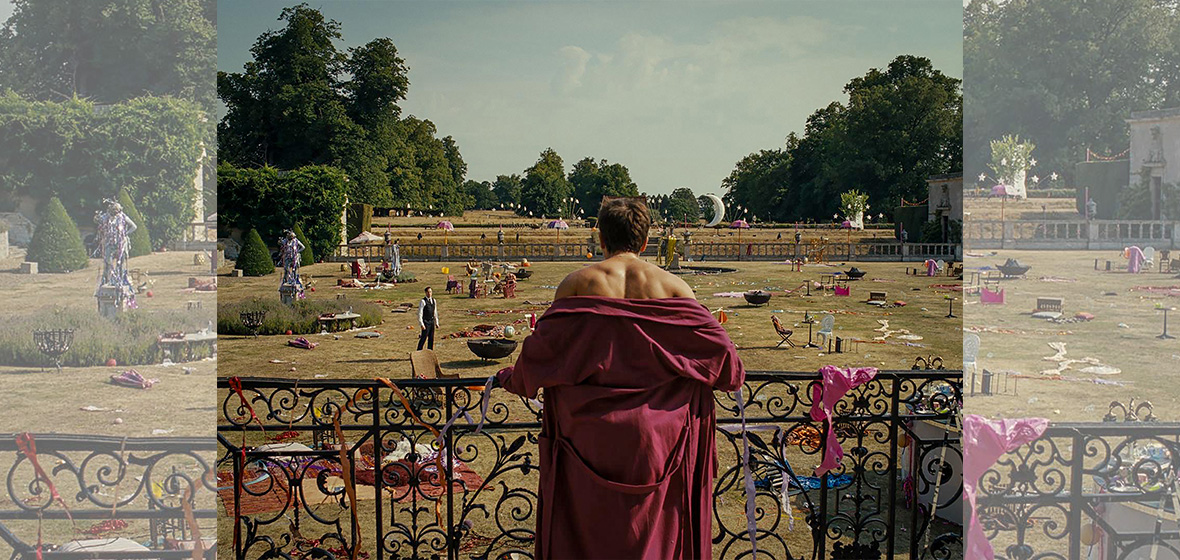There were times in Emerald Fennell’s Saltburn when I didn’t know what to make of it, even if I couldn’t deny it entertained me. Fennell jumped into success in 2020 with the anti-toxic-masculinity satire Promising Young Woman, which I loved but rubbed some people the wrong way. I appreciated Fennell’s bullheadedness to give into her primal instincts. No nuance, no clarity, just full-fledged catharsis, and it’s great.
For her second feature, Fennell changes her target to class privilege. Oliver (Barry Keoghan) is a new Oxford University student struggling to adapt to the wealthy elite. That is until he meets Felix (Jacob Elordi), the aristocratic heartthrob who befriends Oliver despite the class gap. Felix’s group of privileged brats openly dislike Oliver for his lack of style and refinement – he’s awkward, doesn’t have much money, and shops in thrift shops; how dare he. But Felix likes his new mate, and when he learns Oliver’s alcoholic father passed away, he invites him to stay the summer at his family’s palace with his parents (Richard E. Grant and Rosamund Pike), his sister Venetia (Alison Oliver) and a string of scroungers and sycophants who seem to exist only to provide drama and entertained to a bored and disconnected family.
At the start, the family is fascinated by Oliver’s tragic background while exposing the fake façade of humanity and sensitivity. Even Felix’s intentions are questioned, and it’s hinted that it’s a recurring pattern for him to invite new working-class friends to benefit his ego.
The frame is Oliver, years after the event of that summer, retelling the story to someone. “Of course I loved Felix”, he says. “But was I in love with him?”. This confusing emotional perspective tries to add depth to Oliver, who is sexually and emotionally obsessed over Felix but interested in impacting everyone in that family. In a swiping turn of events, his personality changes in a brutal moment of seduction of his sister Venetia. It’s all so amoral and obscene but also utterly compelling.
This is where Fennell wins me over. Because I don’t think she cares about the sociological implications of a working/middle-class boy perverting an aristocratic family to the point the audience is excused if they sympathise with the family. Fennell doesn’t care about that part because, honestly, she doesn’t care about their privilege. Like Cassandra in Promising Young Woman, Oliver is an agent of chaos. His actions are cathartic, representing a comeuppance that Fennell fantasises about. She doesn’t hold back, pushing the story to the limits of decency, all to end in a deranged dance scene to the tune of Sophie Ellis-Bextor’s 2001 disco classic “Murder on the Dance Floor”.
It’s all positively perverted, but for what is worth, it is what makes Saltburn even more compelling. It’s rare to see a big studio film during award season have such an unapologetically pulpiness. This is usually the realm of European satires, not sophisticated productions. And yet, it’s Fennell’s disregard for any subtle thought that makes Saltburn work so well. In the third act, there’s a running gag where the family refuses to address emotional distress to keep the appearances, and it reminded me of the dinner scenes in Thomas Vinterberg’s Celebration. Delighted with her cleverness, Fennell powers through like she doesn’t care what you, me, or anyone for that matter, thinks about it all.
This works because it’s directed with lewd enthusiasm, and the actors glue it all together. Keoghan proves that his Oscar has to be around the corner; his scope goes from awkward fragility to insane sociopath with a flick of a button, and he manages to keep it cohesive. But the Australian Elordi stands out – a mix of Gregory Peck and Rock Hudson. He perfectly complements Keoghan’s insanity while knowing how to add depth and mystery to his Felix. The man has to be a star, and here’s hoping he won’t get lost in the grind of a superhero franchise.
I’m glad Saltburn exists. I’ll think about it for years to come, especially how it seems to push many people’s buttons, who will probably be offended by the film’s lack of nuance. It wants to see the world burn, and sometimes that’s how I wake up too.
Verdict: 3 and a half out of 5
For the problematic pervert in all of us that sometimes needs to be fed.




